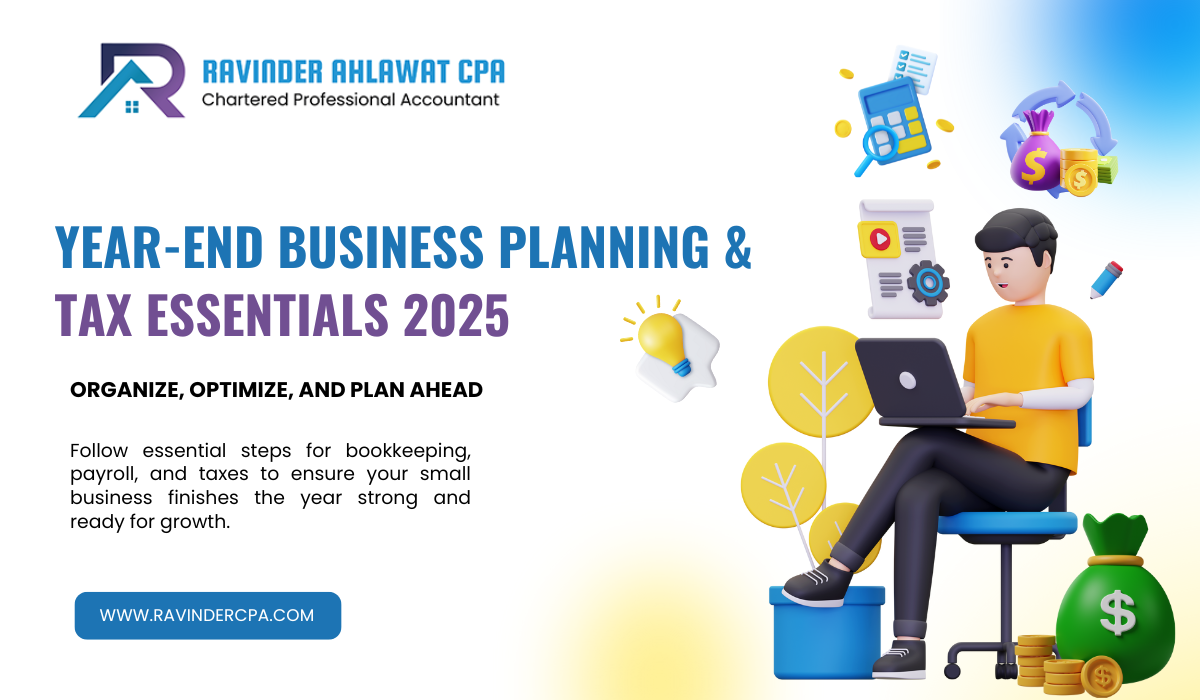Year-end is a critical period for small businesses in Canada. Reviewing finances, organizing records, and planning ahead can make the closing process smoother while helping to optimize taxes. Proper preparation allows businesses to identify potential issues, ensure compliance, and make strategic decisions that set the stage for success in the coming year.
Ravinder Ahlawat CPA, a trusted accounting and tax services firm, specializes in helping small businesses navigate year-end with confidence. From bookkeeping and financial reporting to income tax filing and tax planning, the firm provides actionable guidance designed to simplify complex processes.
This blog outlines practical steps that every business owner should consider before year-end. Reading it will help you understand how to organize your finances, maximize deductions, and plan strategically, so your business enters 2026 on a strong footing.
1. Maintain Accurate Bookkeeping
The first step in preparing for year-end is ensuring your bookkeeping is complete and accurate. Incomplete or disorganized records can complicate financial reporting and tax filing.
- Bank Reconciliation: Check that all deposits and withdrawals are recorded correctly. Any discrepancies should be addressed promptly.
- Expense Tracking: Make sure all business expenses, from office supplies to professional fees, are properly documented.
- Accounts Receivable: Follow up on outstanding invoices to improve cash flow before closing the year.
Engaging a professional cpa accountant can help streamline these tasks and ensure your records are up-to-date, saving time when it comes to filing taxes.
2. Review Financial Statements Carefully
Financial statements provide insight into your business’s performance and are essential for decision-making.
- Income Statement & Balance Sheet: Review revenue, expenses, and profitability to understand how the business performed.
- Trends and Patterns: Look for areas where expenses are increasing or revenue is slowing, and identify opportunities for improvement.
- Planning Decisions: Use this information to guide decisions about investments, hiring, or other strategic moves for the new year.
Working with Ravinder Ahlawat, recognized among Chartered Professional Accountants in Brampton, provides confidence that your business’s financial reporting is both precise and reliable.
3. Optimize Tax Deductions and Credits
Year-end is an ideal time to ensure your business takes advantage of all available tax deductions. Common areas include:
- Home office expenses and utilities related to your business space
- Vehicle costs if the vehicle is used for business purposes
- Professional services, including accounting, consulting, or legal fees
- Equipment and technology purchases needed for business operations
Accelerating certain expenses before the year closes can reduce taxable income. Consulting a personal tax accountant ensures that all eligible deductions are identified and applied correctly.
4. Manage Payroll and Year-End Bonuses
Payroll and employee bonuses require careful attention to remain compliant and avoid penalties:
- Verify that all payroll transactions have been processed accurately
- Calculate and document any bonuses planned for the year
- Prepare T5 slips and other required tax documents in advance
A professional accountant can simplify payroll management, help calculate deductions, and ensure that all reporting requirements are met efficiently.
5. Conduct a Year-End Inventory Review
Businesses that manage inventory should perform a thorough review to ensure accuracy:
- Conduct a complete inventory count and reconcile it with your records
- Write off any obsolete, damaged, or unsellable stock
- Consider sales or clearance strategies for excess inventory before the year ends
Accurate inventory records not only improve your financial statements but can also create tax benefits through proper valuation and write-offs.
6. Plan for Tax and Financial Strategy
Year-end is an opportunity to make strategic decisions that impact both tax and overall business performance:
- Timing Income and Expenses: Consider deferring income or accelerating expenses to manage taxable income efficiently
- Government Programs: Review eligibility for tax credits or incentive programs
- Cash Flow Planning: Analyze cash flow to ensure the business can meet obligations and invest in growth opportunities
Working with a CPA ensures these strategies are applied correctly, helping your business optimize its tax position while remaining compliant.
7. Set Goals and Plan for the Next Year
Year-end is also the perfect time to plan for 2026:
- Define revenue and growth targets based on current performance
- Plan new products, services, or marketing initiatives
- Identify areas to optimize expenses without compromising quality
- Align budgets with long-term business objectives to ensure sustainable growth
Strategic planning combined with professional accounting support can make the transition into the new year smoother and help your business achieve its goals. Preparing for year-end is essential for accurate financial reporting, optimizing taxes, and setting up sustainable growth. Keeping bookkeeping up-to-date, reviewing financial statements, and planning strategically ensures you close 2025 confidently and start 2026 on strong footing.
At Ravinder Ahlawat, we provide comprehensive support to help businesses in Mississauga and Brampton navigate year-end efficiently. Our services include CPA support, personal taxation services, and full-service accounting solutions, covering payroll, inventory management, and tax filing. By offering practical guidance tailored to your business needs, we help save time, reduce stress, and enable informed financial decisions.
Contact us today at 905-247-8001 or email ravinder@ravindercpa.com to discuss how we can support your business with expert accounting and taxation services in both Mississauga and Brampton.


